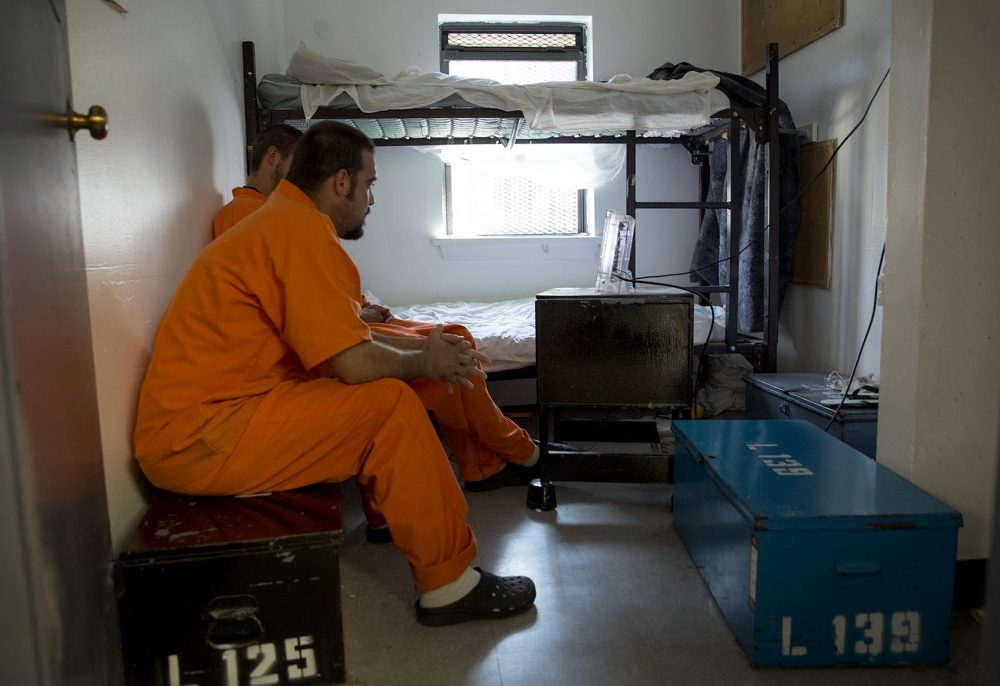Advertisement
Mass. legislators debate whether to fund addiction programs that lock people up
Resume
Massachusetts lawmakers are debating whether to continue supporting programs that put people inside jails and prisons for addiction treatment.
Both Gov. Charlie Baker and the House leadership have proposed setting aside roughly $23 million in the budget for such addiction programs. But State Rep. Ruth Balser has filed budget amendments to eliminate the funding and redirect it to community treatment programs.
Some advocates rallied outside the State House on Wednesday to urge lawmakers to halt funding the prison programs that commit people to addiction treatment inside correctional facilities.
Emily Smith, of Hingham, is among those who spoke out against the programs, sharing her personal experience with her brother.
Smith said she went to court earlier this year to commit her brother to treatment because she was concerned about his mental health and his drug use. But she didn't realize he would be sent to the Plymouth County State Prison for treatment.
"The first time he called me days after being there he was so upset and so mad at us," Smith said. "He said, 'Why did you throw me in jail?' "
Her brother, Chris Hiltz, said police arrested him while he was living in his car and took him to court. A judge then determined that his drug use was dangerous enough for an involuntary commitment. So, Hiltz said, he was shackled, handcuffed and transported to Massachusetts Alcohol and Substance Abuse Center at the Plymouth prison. While he was there, he said he received little help.
"The worst experience of my life," said Hiltz, 35. "I'll be honest, I've been to many detoxes. I've been to a lot of mental health places, but never in my life experienced this."
After spending 32 days at the prison, Hiltz said he was dropped off at a homeless shelter. But there weren't any beds available. Soon after, he said, he relapsed.
"The place made me want to do more drugs," Hiltz said. "The place made me more depressed and angrier than I already am."
Hiltz was committed under the state law known as Section 35. It allows a judge to involuntarily commit someone to treatment if their substance use is considered dangerous. The largest Section 35 facilities for men are in correctional facilities, including the one in Plymouth and another run by the Hampden County Sheriff in his jail.
Todd Kerensky, president of the Massachusetts Society of Addiction Medicine, said he also opposes the use of criminal justice facilities for treatment. He said people should be treated in the community instead, adding that the risk of overdose is higher among those who have been incarcerated.
"We can have a reasonable debate about whether involuntary treatment is potentially helpful or harmful," Kerensky said. " However, putting people in jail to receive treatment is unjust. Having a substance or alcohol use disorder is not a crime."
The House leadership has proposed $23 million in its budget plan, a $1.5 million increase over the current fiscal year spending for Plymouth. Baker has proposed a similar amount. Balser not only wants to eliminate the funding, but also require that it be redirected to community programs and the state ensure that there are Section 35 facilities run by either the Department of Public Health or Department of Mental Health instead of the state prison system or local sheriffs.
"I don't believe we should put more precious state dollars into archaic, and I would even say inhumane institutions," Balser said. " But at the same time, we need the legislation to require that Health and Human Services set up the appropriate programs for these seriously addicted individuals."
She said Massachusetts is the only state in the nation that uses jails and prisons for involuntary commitment to addiction treatment when someone hasn't committed any crime. Balser was also a member of a state commission that recommended in 2019 that lawmakers prohibit "civilly-committed men from receiving treatment for addictions at any criminal justice facility." The state stopped committing women to prison for treatment in 2016 after a lawsuit, but a similar suit involving men is still pending.
But some family members of those addicted said taking civil liberties away from their loved ones may have saved their lives. They said they were glad the state offers the option of forced, locked treatment for someone whose life has been taken over by substance use.
Neither the Department of Correction nor the Hampden County sheriff responded to requests for comment.
The House plans to begin formally debating the budget proposals next week.
This segment aired on April 21, 2022.
